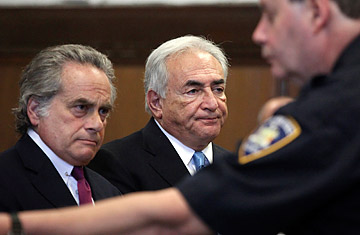
Former IMF Chief Dominique Strauss-Kahn reacts as he stands with his attorney Ben Brafman in front of a court officer after he was released without bail during a hearing at New York State Supreme Court in Manhattan, July 1, 2011.
In the hours before Dominique Strauss-Kahn arrived in court on Friday morning, rumors flew that prosecutors might drop the case against the former director of the International Monetary Fund. As first reported in the New York Times, prosecutors disclosed to Strauss-Kahn's lawyers on June 30 that the woman accusing him of trying to rape her in his hotel suite had lied to investigators on a number of occasions and that her credibility had come into question. Judge Michael J. Obus, who is in charge of the case, called a hearing for the next day, well in advance of the previously scheduled session.
In a letter to Strauss-Kahn's lawyers, Assistant District Attorney Joan Illuzi-Orbon explained the accuser had lied on her application for asylum from the government of Guinea, claiming that her husband had been repeatedly beaten by soldiers. She later admitted this was a lie. The accuser had also told investigators as the case got underway that she had once been gang raped in Guinea; she later changed her story, saying that the gang rape never occurred, but that she had been raped once before.
But in perhaps the most damning revelation in the letter, prosecutors disclosed that the accuser had changed her story about her actions immediately after the alleged assault. She initially told investigators that she reported the assault to her supervisor right away, but later admitted that she cleaned a nearby room, then began cleaning the suite where she said she was attacked before reporting the assault to her supervisor.
In Friday's hearing, Illuzi-Orbon read a statement before the court where she said that the disclosures outlined in the letter, "caused us to reassess the strength of our case." Judge Orbus vacated Strauss-Kahn's bail agreement and released him on his own recognizance. But before adjuring court, Orbus reminded Strauss-Kahn that the bail was not meant as a punishment, but to ensure that he appeared at the required hearings and did not flee justice. He said that Strauss-Kahn's passport and travel documents will remain with the court and that he will be required to appear at the next hearing on July 18.
Meanwhile, headlines blared that the case was teetering near collapse. Rape cases, especially ones that devolve into a "he said-she said" argument over whether a given sexual encounter was consensual, often hinge on the credibility of the accuser. The revelations that caused the state to acquiesce to freeing Strauss-Kahn led many observers to believe that the case was now unwinnable.
The accuser's lawyer, Ken Thompson, charged the Manhattan District Attorney's Office with being fearful about losing a high profile case only months after another high profile loss, that one involving two police officers acquitted of rape. Thompson claimed that there is substantial forensic and medical evidence that will be revealed in court. He said that Strauss-Kahn ripped the woman's pantyhose, tore a ligament in her shoulder and grabbed her so hard that he caused visible bruising on her vagina. The woman said that Strauss-Kahn forced her to perform oral sex, after which Thompson said she crawled away from Strauss-Kahn, and as she was fleeing, she spit his semen on the floor and wall of the hotel suite. Thompson claimed that all of the details had been documented by crime scene investigators and would be revealed in the trial.
If the forensic evidence is as damning as Thompson claims, speculation about the case's demise might be premature. Manhattan prosecutors won a recent case where the rape victim was a prostitute. In that case, which is detailed in the new HBO documentary Sex Crimes Unit, Assistant District Attorney Coleen Balbert told the jury that no one, not even a prostitute, deserves to be raped. That case featured definitive and graphic forensic evidence, and if Thompson's details are true, the forensic evidence could be just as compelling.
All victims are different, in widely complex ways. And bringing an accusation is complicated by each one's situation — and by societal prejudice against women who cry "rape." As filmmaker Lisa F. Jackson told TIME on June 17, "I hope that they see, for instance in the DSK trial, the incredible courage it took for the hotel housekeeper to come forward. Sixty percent of these crimes are not reported at all because victims tend to blame themselves and there's that subtle blame-the-victim idea with some jurors. Linda Fairstein, former head of the unit, made the incredible comment that it's the only crime she's ever encountered where the victim is somehow complicit in the crime that's been perpetrated against them. There are still all of these attitudes and prejudices, misconceptions and outright myths, like that you have to have a major injury to have been raped. Juries actually believe that."
Yet even with physical evidence of the nature described by Thompson, Strauss-Kahn's most likely defense will be that the encounter was consensual. His lead attorney, Benjamin Brafman, is a skilled trial lawyer who has won many high profile cases and written articles on cross-examination. Strauss-Kahn's accuser would have had a difficult time on the stand even if her story had been airtight. Now that Brafman has significant ammunition to attack her credibility, the case against Strauss-Kahn is much weaker.
Manhattan District Attorney Cyrus Vance made it clear that they were proceeding with prosecuting Strauss-Kahn, but admitted that today's decision was an indicator of a weakening of the case. "The bail amount was based in part on the strength of the case," Vance said. "But today's proceedings didn't dismiss the case or change any charges. We will proceed with the case and continue to keep the victim safe."
